Essays, Articles, Chapters by Kevin L Hughes
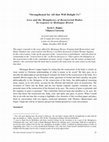
Saint Anselm Journal, 2017
né potrà tanta luce affaticarne: ché li organi del corpo saran forti a tutto ciò che potrà dilett... more né potrà tanta luce affaticarne: ché li organi del corpo saran forti a tutto ciò che potrà dilettarne. 1 Dante, Paradiso XIV.58-60 This paper responds to the essay offered by Montague Brown, bringing Saint Bonaventure and Dante Alighieri into conversation with Brown's excellent discussion of Saint Thomas Aquinas. In this conversation, I take up the question of the "resurrection to punishment" and ask about its relationship to the "resurrection to life" as Brown discusses it. I then explore the fittingness of the resurrection to life in the communion of saints. Lastly, I inquire into the nature of numerical identity-the conviction that the body that is raised is the same body (in some sense) as the body that died. Montague Brown's paper begins by noting that the resurrection of the body is clearly an issue central to Christian understanding of what it means to be saved. 2 He then goes on to describe the philosophical and theological warrants for belief in the resurrection of the body. In a nutshell, Brown argues that, in Thomistic terms, questions of formal and final causality can point philosophically to the fittingness of the resurrection of the body, but philosophical reasoning alone cannot, in its own terms, account for the efficient and material cause of resurrection. The invitation of Christ into his Body and the free human response together constitute the very personal cause of the resurrection of the blessed; as he says, "the source of grace is personal, and the response to grace is personal." This conformity between head and members is, he says, the force that draws the resurrected one, body, soul, and spirit, into glory in patria. What I would like to do with our time this evening is highlight a few elements of this excellent paper and place them in conversation with two figures connected intimately with Thomas-Bonaventure and Dante. I hope this will be of interest and provide fruitful ground for a rich conversation. Surnaturel
Medieval Mystical Theology, 2019
Following recent interdisciplinary interest in the 'spiritual senses' and 'spiritual sensation,' ... more Following recent interdisciplinary interest in the 'spiritual senses' and 'spiritual sensation,' this essay examines the Tree of Life, Bonaventure's meditations on the life of Christ, through the interpretive lens of the 'spiritual senses.' The article proposes that the spiritual senses are not thematic but architectonic and hermeneutical in this treatise. Rather than addressing the senses explicitly, Bonaventure uses them instead as principles of composition and interpretation, eliciting spiritual perception from readers as they contemplate Christ's life and death. Such a reading brings the elusive character of spiritual perception into relation with sensible and imaginative perception, reconceiving the relationship between body and soul, affect and intellect.
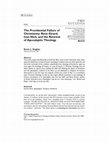
Pro Ecclesia, 2019
The article argues that René Girard and Ivan Illich, each in their distinctive ways, draw upon th... more The article argues that René Girard and Ivan Illich, each in their distinctive ways, draw upon the dimensions of the Christian apocalyptic tradition that are often ignored, and that their retrievals of this tradition, specifically of its theology of Antichrist, open up once again the theology of history, an area of inquiry in Christian theology that we often dismiss or ignore, thus yielding the field and allowing the figure of Antichrist and the apocalyptic tradition to be taken up and deployed as weapons of mimetic destruction in just the ways our popular culture has come to fear. It is incumbent upon Christian theology to take up once again difficult questions in the theology of history, particularly in an apocalyptic key, and Ivan Illich and René Girard, neither of whom claimed to be a theologian, may be our "two witnesses," our "Enoch and Elijah," who help us to do just that.
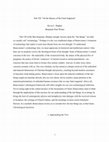
Part VII of the Breviloquium, fittingly enough, focuses upon the " last things, " on what we usua... more Part VII of the Breviloquium, fittingly enough, focuses upon the " last things, " on what we usually call " eschatology. " Perhaps it is the very traditional shape of Bonaventure's treatment of eschatology that makes it seem most distant from our own thought. To understand Bonaventure's eschatology best, we must appreciate its historical and intellectual context. Only then can we properly receive the theological fruits of his thought. Some of Bonaventure's central concerns in the text—the materiality of the resurrected body, the nature of the physical fire of purgation, the justice of divine " sentences " of eternal reward or eternal punishment—are concerns that may seem alien to twenty-first century readers. And yet, in other ways, these concerns resonate with us. Our own scholarly era has aimed at a deeper retrieval of the embodied and material dimensions of Christian thought and practice, reaching beyond modern caricatures of Jansenist, body-hating pieties. Bonaventure's focus upon the material conditions of the last things might not translate directly into our own idiom, but he models a deep attention to the material particularities of embodied human existence that we may find congenial. Above all, Bonaventure's theological framework still offers insights for our own eschatological reflection. Never losing sight of the central mystery of the Incarnation of Christ, Bonaventure aims to think through the implications of this mystery for our understanding of the last things. In so doing, he brings the best of contemporary physics and metaphysics into dialogue with the received witness of Scripture, the writings of Church Fathers, and the teachings of more recent Scholastic Doctors. In a nutshell, Bonaventure invites us to consider how the last things are, at their heart,
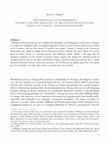
Spazio filosofico, 2017
Although mendicant poverty has been critiqued both practically and theologically in recent years,... more Although mendicant poverty has been critiqued both practically and theologically in recent years, it captures an insight into ontological reality as contingent beings that Francis of Assisi aimed to capture in his Canticle of the Creatures, and one that should be explored more deeply. Through a reading of the Franciscans Bonaventure and Angela of Foligno and the Dominican Meister Eckhart, this essay explores the evocative power of radical poverty as a spiritual practice and theological symbol. Indeed, I will argue that the theological significance of the " symbol " of poverty emerges properly only through the embodied practice of evangelical poverty itself. In this light, the theoretical critiques of poverty remain just and only that – anemic theoretical dismissals without a lived sense of practice. If Paul Ricoeur has rightly argued that " the symbol gives rise to thought, " we might add, in this case, practice gives rise to symbol.
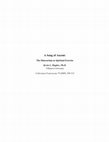
Abstract - The article explores Bonaventure's use of formal rhetorical tropes as theological devi... more Abstract - The article explores Bonaventure's use of formal rhetorical tropes as theological devices. That is, it argues that Bonaventure uses devices in classical rhetoric as a kind of formal theological argument. The Itinerarium, embellished in several places and rhetorically spare in others, aims to guide the reader into the love of wisdom and away from 'vain curiosity.' In this light, the Itinerarium is an intentional, condensed 'performance' of the habits of both prayer and discursive reason, of symbol and of syllogism, of scriptural exegesis and metaphysics, all inscribed in right relation, not only by discursive argument, but also through Bonaventure's rhetorical invention.
Sommario: L'articolo esplora l'uso che Bonaventura fa dei tropi formali della retorica come strumenti teologici. Si dimostra cioè che Bonaventura usa gli strumenti della retorica classica come una specie di argomento teologico formale. L'Itinerarium, abbellito dalla retorica in diversi luoghi e misurato in altri, tende a condurre il lettore all'amore della sapienza e lontano dalla 'vana curiosità'. Sotto questo aspetto l'Itinerarium è una voluta e densa 'performance' dei caratteri sia della preghiera che del discorso ragionato, del simbolo e del sillogismo, della esegesi scritturale e della metafisica, il tutto inserito in una corretta relazione non solo dal ragionamento deduttivo, ma anche dalla creazione retorica di Bonaventura.
Responding to Thomas G. Plante's essay on the transcendent value of a liberal education, I argue ... more Responding to Thomas G. Plante's essay on the transcendent value of a liberal education, I argue that liberal arts disciplines cannot and should not attempt to justify themselves as providing marketable skills. Instead, I offer a different way of conceiving the relationship between the liberal arts and the other disciplinary studies in the university, and indeed of conceiving the university itself. For Tom Plante's paper and a summary of the discussion that followed his paper and my response, see the link below to Integritas, the Boston College journal.
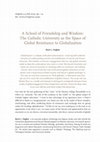
Globalization is a deeply ambivalent phenomenon, involving both widened horizons of understanding... more Globalization is a deeply ambivalent phenomenon, involving both widened horizons of understanding and the commodification of natural and human resources. The Catholic university's engagement with our new global situation needs to keep this ambivalence very much in mind. We should remember and renew our sense of ourselves as standing within an institution, the Catholic Church, that is one of the few truly multicultural global institutions on the planet, with a long history of both success and failure in global exchange. In this way, we may have resources to " think globally " in alternative ways that opt out of or resist the commodification of global interest. This essay will use Matteo Ricci as a model and attempt to distinguish analogically between those modes of global engagement that emerge from and then renew the deep roots of our own identity and those modes that deracinate. Our task for the last gathering of this " class " of the Boston College Roundtable is to reflect on, variously, " the role of the academy in the world " or " the global impact of Catholic higher education. " I want to take advantage of my ignorance here—I find it difficult to think in a programmatic way about our role in the midst of these complex, interlocking, and often conflicting forms of commerce and exchange that we group under the heading " globalization. " I'd like to use my own inadequacy to the task as an opportunity to do what I can—to name some of the threats and opportunities that we encounter as we are drawn, ever-more-inexorably, into these various networks of global Kevin L. Hughes is an associate professor of theology and religious studies and chair of both the Humanities department and Classical Studies program at Villanova University. His research specialties are in ancient and medieval Christian theology, spirituality, and history. Among his books are Augustine and Liberal Education; Constructing Antichrist; and Church History: Faith Handed On. His articles have appeared in journals such as Modern Theology; The Heythrop Journal; Theological Studies; and Franciscan Studies.
This essay is a contribution to a special issue of Modern Theology on the relationship between th... more This essay is a contribution to a special issue of Modern Theology on the relationship between the Scriptural Reasoning movement, the like-minded Receptive Ecumenism movement, and the documents and legacy of the Second Vatican Council. I encourage readers to check out the whole volume. My own intervention looks at the role of Henri de Lubac and other Ressourcement theologians in shaping the Council's approach to Scripture. These intramural developments in Catholic thought have the effect of preparing the ground for serious Catholic engagement with Jews and Muslims in the Scriptural Reasoning movement.
Conventional Catholic interpretations of Thomas Aquinas and Bonaventure often pose them as dialec... more Conventional Catholic interpretations of Thomas Aquinas and Bonaventure often pose them as dialectical opposites representing two distinct theological traditions. This article calls these interpretations into question, and, after offering an alternative sketch of each thinker's theological accomplishment, argues for a Catholic theology of history and tradition that can admit plurality without resorting to binary opposition.
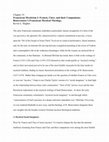
Lamm/The Wiley-Blackwell Companion to Christian Mysticism, 2012
The early Franciscan community embodied a particularly intense recognition of a form of the vita ... more The early Franciscan community embodied a particularly intense recognition of a form of the vita apostolica, the apostolic life, characterized by a radical commitment to poverty, a focus upon the "life of the Gospel of Jesus Christ" lived out in a kind of performative, literal imitation, and, for the men, an itinerant life moving between evangelical preaching in the towns of Umbria and a contemplative life in the wilderness hermitages, while for the women, an enclosed life in the community at San Damiano. As Bernard McGinn has noted, there is little in the writings of Francis (1182-1226) and Clare (1194-1253) themselves that would qualify as "mystical writing," and yet their movement proved to be one of the most fruitful vineyards for the later medieval mystical tradition, finding its classic theoretical articulation in the writings of St. Bonaventure (1217-1274).
My contribution to the Brill Companion to Bonaventure, eds. Jay M. Hammond, J.A. Wayne Hellmann, ... more My contribution to the Brill Companion to Bonaventure, eds. Jay M. Hammond, J.A. Wayne Hellmann, and Jared Goff (Brill, 2013). Here I survey Bonaventure's extensive writings in defense of the mendicant vocation amid the various slings and arrows of the outrageous seculars. I argue for a theological (and not simply a practical, institutional, or legal) rationale that underlies all his arguments. Mendicancy as a form of life is intimately connected, for Bonaventure, to the metaphysics of exemplarity.
This is my contribution to published symposium on the thesis of Dieter Hattrup concerning Bonaven... more This is my contribution to published symposium on the thesis of Dieter Hattrup concerning Bonaventure's *On the Reduction of the Arts to Theology*. Hattrup notoriously has argued that the *Reduction* cannot be a work of Bonaventure's because its theological vision is inconsistent with the Seraphic Doctor's other works. I am grateful for Hattrup's question, but I aim to defend the consistency of Bonaventure's *Reduction* within his larger oeuvre. The implications of what might seem like a petty medievalists' squabble over manuscripts and dating are significant for larger questions of faith and reason. So my article is an appreciative theological refutation, of sorts.
Franciscan Studies, Jan 1, 2011
Modern Theology, Jan 1, 2005
Modern Theology, Jan 1, 2003
Augustine and liberal education, Jan 1, 2000
Chapter Six The" Arts Reputed Liberal": Augustine on the Perils of Liberal Educ... more Chapter Six The" Arts Reputed Liberal": Augustine on the Perils of Liberal Education Kevin L. Hughes Introduction: Augustine or Liberal Education? Augustine is often cited across denominations as an exemplary figure in the history of what for lack of better terms we may call the ...
Collectanea Franciscana, 2002
Using Ernesto Buonaiuti's notion of a "corporate-social mysticism," this essay explores the theol... more Using Ernesto Buonaiuti's notion of a "corporate-social mysticism," this essay explores the theology of history of Joachim, Bonaventure, and Olivi as a kind of mystical theology. In this light, their differences and similarities emerge in a new way, and their shared concern for the transformative path of the church may seem less alien.
The Heythrop Journal, Jan 1, 2001
Augustinian Studies, Jan 1, 1999










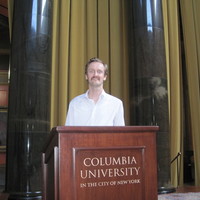
Uploads
Essays, Articles, Chapters by Kevin L Hughes
Sommario: L'articolo esplora l'uso che Bonaventura fa dei tropi formali della retorica come strumenti teologici. Si dimostra cioè che Bonaventura usa gli strumenti della retorica classica come una specie di argomento teologico formale. L'Itinerarium, abbellito dalla retorica in diversi luoghi e misurato in altri, tende a condurre il lettore all'amore della sapienza e lontano dalla 'vana curiosità'. Sotto questo aspetto l'Itinerarium è una voluta e densa 'performance' dei caratteri sia della preghiera che del discorso ragionato, del simbolo e del sillogismo, della esegesi scritturale e della metafisica, il tutto inserito in una corretta relazione non solo dal ragionamento deduttivo, ma anche dalla creazione retorica di Bonaventura.
Sommario: L'articolo esplora l'uso che Bonaventura fa dei tropi formali della retorica come strumenti teologici. Si dimostra cioè che Bonaventura usa gli strumenti della retorica classica come una specie di argomento teologico formale. L'Itinerarium, abbellito dalla retorica in diversi luoghi e misurato in altri, tende a condurre il lettore all'amore della sapienza e lontano dalla 'vana curiosità'. Sotto questo aspetto l'Itinerarium è una voluta e densa 'performance' dei caratteri sia della preghiera che del discorso ragionato, del simbolo e del sillogismo, della esegesi scritturale e della metafisica, il tutto inserito in una corretta relazione non solo dal ragionamento deduttivo, ma anche dalla creazione retorica di Bonaventura.